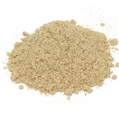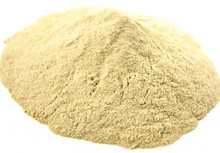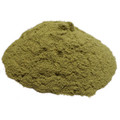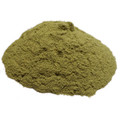 Loading... Please wait...
Loading... Please wait...- Home
- Bulk Herbs
- Herbs (O-P)
- Psyllium Husk Powder
- Home
- Herbs - Organically Grown & Wild Crafted USA
- P Q
- Psyllium Husk Powder
Product Description
Psyllium Husk Powder
Also Known As - Plantago ovata, Psyllium ovata, Plantago psyllium, blonde psyllium, and isphagula.
Wild Crafted - USA from the basin of the Nisqually River, WA
Overview - Psyllium is a small herb that grows to about 12 to 18 inches tall. The root grows into a long taproot and the plant flowers about sixty days after planting. The plant is grown for its seeds. The seeds are run through a mill that removes the husks. These husks are then ground down into powder or very small pieces. The husks produce a mucilage, that when mixed with water, turn into a colorless gel. When water is added, it increases the bulk by tenfold. Used as a dietary fiber, it helps clean out the bowels and maintain health. The herb is not able to be absorbed by the intestines, so its job is to absorb excess moisture while stimulating normal bowel elimination.
Medicinal Uses - Internally, Psyllium can be helpful in lowering LDL, or "bad" cholesterol. It does not lower it in great amounts, but it can be a starting point. It is a common ingredient for bulk laxatives and can help relieve constipation. This herbal remedy has been used to treat diarrhea, especially in patients who are tube fed. Some patients use it to prepare their systems for colonoscopy.
- Studies are underway to determine if psyllium taken with meals can have any effect on hyperglycemia (high blood sugar). Some people use it to treat inflammatory bowel disease and irritable bowel syndrome. There is some evidence that suggests it may be helpful in dealing with obesity, especially in children.
Other Uses – A technical grade of the herb is used to improve water retention in soil for newly planted lawns.
Herbs to Combine/Supplement - Studies have shown that psyllium is more effective at lowering blood sugar and cholesterol when taken as part of food, like cereal, rather than as a dietary supplement.
Parts Used - The seeds of this plant are harvested and the husks are used to make a mucilage.
Precautions - If you suffer from stool impaction, obstruction or narrowing of the bowel, diabetes or allergies, check with your care giver before you take this herb. Side effects may include gas, bloating or feelings of fullness. Allergic reactions may be rash, swelling, itching, dizziness or difficulty breathing. Contact medical help if you experience these effects or others.
Suggestions - Dietary fiber recommendations for adults should be between 20 and 25 grams per day. Divide the doses throughout the day, they are usually taken just before eating. If you are taking psyllium laxatives, be sure you drink enough water to reduce the possibility of bowel obstruction.
- For children, 3.4 to 16 grams taken orally has been suggested.
- Take with at lease 8 oz. of water. Taking this product without adequate fluid may cause it to swell and block your throat or esophagus and may cause choking. Do not take this product if you have difficulty in swallowing. Other drugs should be taken one hour prior to consumption of psyllium or several hours after consumption, as psyllium may reduce the absorption of certain drugs due to the mucilage content and the increased speed of passage through the intestines.
Disclaimer - The information presented herein by Mountain Maus’ Remedies is intended for educational purposes only. These statements have not been evaluated by the FDA and are not intended to diagnose, cure, treat or prevent disease. Individual results may vary, and before using any supplements, it is always advisable to consult with your own health care provider.
















